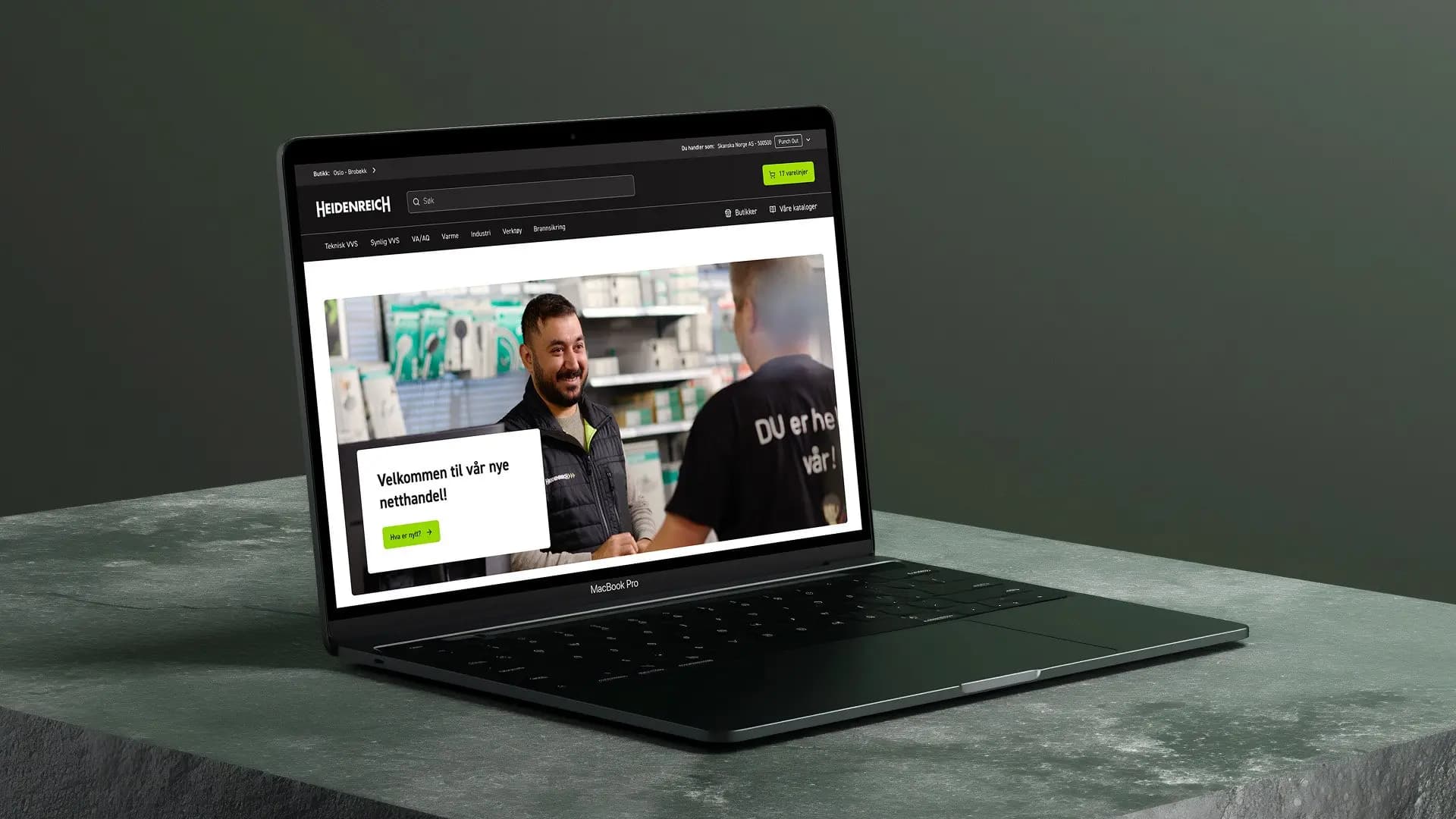CASE
HEIDENREICH
New e-commerce platform and integration hub – developed in close partnership with Knowit
Heidenreich and Knowit have developed a new e-commerce solution and integration hub through a close, agile collaboration built on openness, trust, and shared goals. The result: Improved customer experience, increased digital visibility, and a future-ready platform for growth.

CHALLENGE
From complexity to customer-friendliness
Heidenreich is a well-established player in the HVAC and plumbing industry. With increasing demands from both the market and customers, they needed to rethink their digital approach. They wanted a new platform capable of handling complex product data, supporting new business models, and making it easier for plumbers to quickly find the right products.
The existing solution was feature-rich but felt heavy and unintuitive. They also needed a structured, future-proof integration hub to improve data quality and ensure seamless system integration.The ambition was clear: Build for the future—together.
Working with Knowit gives Heidenreich the capability to operate in an agile, forward-thinking, and efficient way. Together, we achieve things no one thought possible—because we’ve integrated people through a solid framework, openness, and smiles!
James Ocampo, IT and Digitalization Director
Heidenreich

SOLUTION
One team, one direction
From day one, Heidenreich and Knowit worked as one team. Developers, designers, SEO specialists, and business developers sat together with Heidenreich, united by a single goal: to create a platform that truly supports plumbers in their daily work.
The first transactions were completed just 9 months after the project began. Ten selected pilot customers tested the solution in a “Friendly User Trial,” with close follow-up from both Heidenreich and Knowit. By the end of the pilot phase, around 300 customers had provided valuable feedback before the full launch.
In early February 2025, the platform launched at full scale. Over 6,500 orders were placed within the first two months—surpassing the old system’s performance and setting new records.

A strong search function was identified early on as a critical success factor. They chose Algolia as the search engine, leveraging AI capabilities. Significant effort went into training the engine using domain knowledge, user behavior, and insights from interviews and internal/external search data.
User insight was central throughout the process. They interviewed plumbers, observed how they searched for and ordered products, and identified common challenges. Insights revealed that products are often described differently by suppliers, and poor search or incomplete information led to unnecessary order errors. This shaped the entire solution—from information architecture and content to search functionality and product descriptions.
They followed the MVP (Minimum Viable Product) principle, launching early with core features and continuously improving based on real needs and feedback. This allowed for fast and accurate prioritization.

A complex technological ecosystem
The solution had to handle:
- Over 45,000 products with variants and relationships
- Thousands of customers, each with unique pricing and discounts
- Integration with ERP and other critical business systems
- High performance, scalability, and security requirements
- Flexibility for future service development
They chose a modern, loosely coupled architecture based on flexible, cloud-based platforms:
- Norce – E-commerce platform with built-in PIM for structured product data and variant logic
- Sanity – Headless CMS with an editor-friendly interface and flexible content production
- Algolia – AI-powered search engine, fine-tuned using behavioral insights
All systems are connected through an integration hub, enabling seamless data flow with ERP and other internal systems. This improves data quality, reduces errors, and lays the foundation for future services.
SEO as a core component
SEO was integrated from the start. They conducted keyword analysis and worked systematically with structure, metadata, and technical SEO. To make optimization accessible to non-technical content creators, SEO controls were built directly into Sanity.
Editors can manage canonical tags, metadata, Open Graph, Robots.txt, and sitemap functionality. Flexible templates and components allow control over structured data (schema.org), and tools like Screaming Frog and Sitebulb ensured everything was crawlable and indexable.
They also used insights from Algolia to optimize the overlap between internal and external search.

RESULT
User-driven solution that simplifies, improves, and saves time
Through close collaboration, Heidenreich and Knowit created a platform and online store tailored to plumbers’ daily needs and challenges. The tight integration of insight and development, combined with agile teamwork and technical precision, delivered a platform that excels on all fronts:
- A simpler, more efficient shopping experience
- Fewer order errors
- Happier customers
- Increased internal competence in digital sales
- Stronger SEO and market visibility
Shortly after launch, evaluations showed that 9 out of 10 users preferred the new platform over the old one. Most importantly: Plumbers can now quickly find what they need and trust that what they order is correct.
Heidenreich is now better equipped to develop new services and solutions in collaboration with their customers.
Are you struggeling to display your sortiment or efficient search?
Let's talk about it!

Mona Hvattum
Sales Manager, Knowit Norway